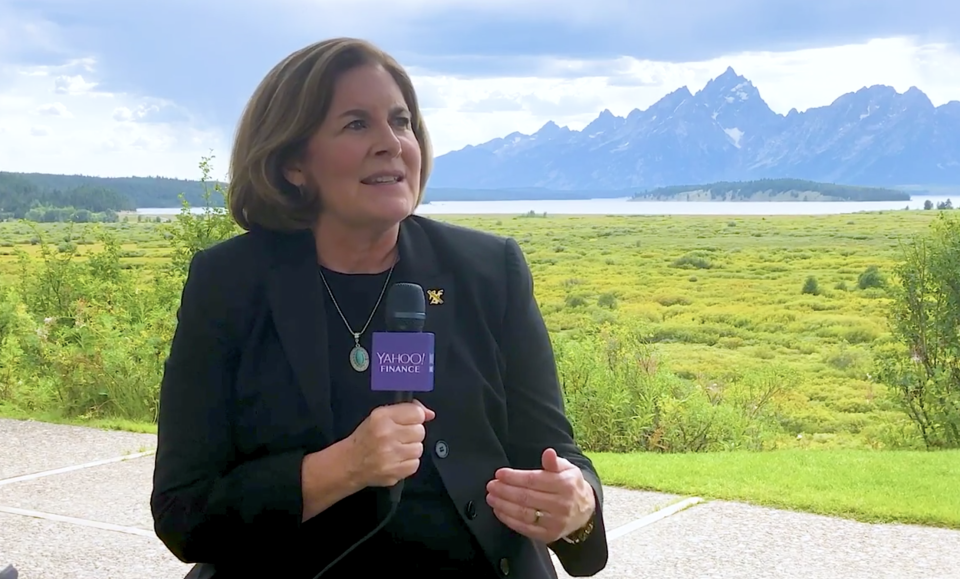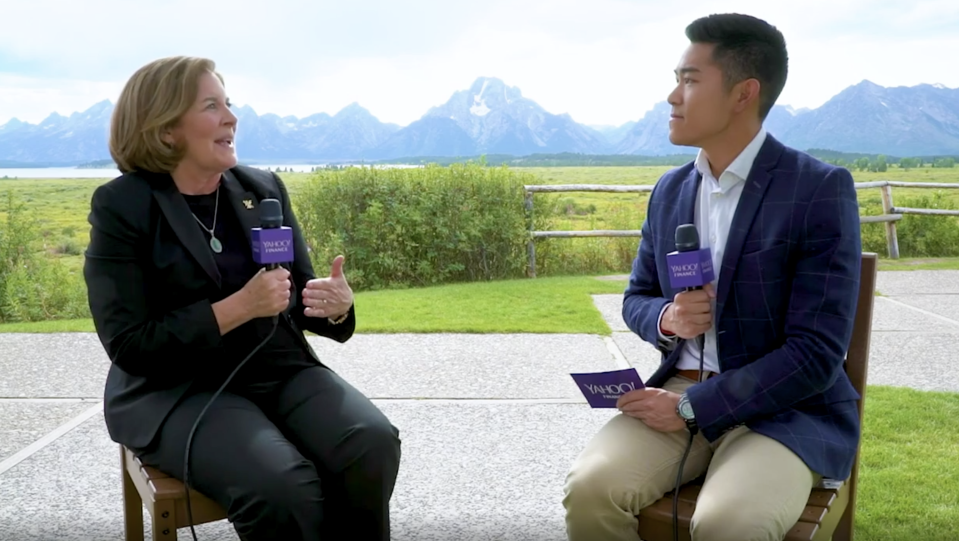Kansas City Fed President Esther George speaks with Yahoo Finance [Transcript]
Esther George, president of the Kansas City Fed, joined Yahoo Finance on Thursday from Jackson Hole, Wyoming, to discuss the state of the economy and the outlook for monetary policy.
Below is a transcript of her appearance:
-
BRIAN CHEUNG: Well, we're here in Jackson Hole sitting down with Kansas City Fed president Esther George. Thank you so much for joining us, President George.
ESTHER GEORGE: Good to see you.
BRIAN CHEUNG: All right, so this year's theme is challenges for monetary policy. What are the challenges for monetary policy at the moment?
ESTHER GEORGE: Well, there are always challenges for monetary policy for sure. What we're thinking about for this year's conference is the past 10 years have put central banks in some very different places — in some uncharted waters, if you will. And this gives us a chance to look at things that have come out of that.
So for example, economies have grown at different paces. You've seen the U.S. economy grow, the rest of the world slowing. You've seen the U.S. normalize policy, other countries have not yet gotten there. So what does that mean in terms of that divergence and how should we think about that?
We'll look at commodity markets. We'll think about what it means to be data dependent. You hear a lot about that.
BRIAN CHEUNG: Great buzz word.
ESTHER GEORGE: Great buzz word around that. So I think we have some good papers. We always enjoy the discussion that will shed some light on these issues. And I hope we walk away with some better insights.

BRIAN CHEUNG: So something that's so unique about this conference is that you have central bankers from all over the world flying here into Jackson, Wyoming. What is the importance of not necessarily coordinating with them, but meeting with them, hearing about what's going on in Japan, in the ECB, in other countries in order for the Fed to understand what the best operating framework is in the U.S.?
ESTHER GEORGE: Right. So I think it's very important that we talk to one another. Because at some level, we all have the same challenges and the same objectives. And that is to achieve our mandates — however those have been ascribed to us domestically.
So, as we talk to one another, as we think about a global economy and how things are working, it brings insight and I hope offers — whether we're dealing with the same issue exactly — a perspective on how we should think about it. Whether we're the U.S. or whether you're a small, open, emerging economy.
[See Also: Fed's George: It's 'too soon' to judge next move on rates]
BRIAN CHEUNG: So one thing that might be a unique challenge with this year's meeting is that the next step for the Fed has kind of begun with the last rate cut on July 31. You dissented against that decision. The minutes came out today. It seemed like there were a wide variety of opinions on the voting FOMC in that meeting.
You said that in your explanation that should incoming data point to a weakening economy, you would be prepared to adjust. Since that meeting — it's only been a few weeks — but since that meeting, has that pointed to a weakening economy?
ESTHER GEORGE: So I think since the meeting, we've had mixed data again. So you saw retail sales come in very strong. There have continued to be concerns, uncertainty around trade that factors into that. So I think it's too soon to judge how the real economy is going to be affected.
So I'll be watching the data up until the time that meeting starts, and frankly, going into that meeting, I want to continue to be open-minded about this as I listen to my colleagues and how they judge how some of these risks are playing into the economy.
BRIAN CHEUNG: Now, it seems like on the communications end there's been some challenges — again, using that buzzword — in terms of the way that the chair can communicate what is a wide variety of opinions on the FOMC, as we saw from that last meeting. Do you think that the Fed is in danger or has made communications mistakes in recent weeks?
And if so, what is the best way to approach that, given how sensitive markets have been in the past few weeks?
ESTHER GEORGE: So I think the Federal Reserve's commitment has been to being as transparent as they can. And I think Jay Powell has committed to that by having a press conference at every meeting. Certainly, as the policy choices become more difficult, the challenges arise on how to communicate that. So I think he has done a good job of trying to express how the committee arrives at its decisions. And it will be a challenge, I think, going forward until some of the uncertainty is resolved.
[See Also: Fed's George: Rate cuts 'not likely to resolve' trade uncertainty]
BRIAN CHEUNG: So heading into the next FOMC meeting, it seems like markets are coming into view, especially given what the yield curve has done — briefly inverting last Wednesday, although it's since un-inverted. What is the proper way to interpret what the yield curve is doing in terms of its changing shape? And how should policymakers be thinking about reacting to it possibly with interest rate policy?
ESTHER GEORGE: So for me, I want to be careful reacting to the yield curve. I think you want to watch the yield curve carefully to try to understand what are markets seeing, why are long term rates performing the way they are?
And we are very conscious about the fact that those inversions often precede recessions. But you have to understand what the message is coming out of that yield curve inversion. And I think right now, although I am always careful to say this time is different-- I think there are some factors when you look at the rest of the world and the weaknesses in some of those economies. That could be playing in to why we see long term rates so low.
BRIAN CHEUNG: And it's interesting you bring that point up, because it seems like there's kind of a weird first order, second order, third order condition to all of this, which is that trade policy is something everyone's watching very closely. Is it trade policy that's making the yield curve invert, which is making the Fed reactive? Or is it maybe some different order there? How do you see the trade risks and how do you weigh what the proper response is from the Fed side to either insulate or insure against what those risks are?
ESTHER GEORGE: So I think what we've seen so far — and I take this from our own business contacts who talk about how they're thinking about investment-- when you have high levels of uncertainty, that can cause you to pull back. And I think that's what we're seeing.
Cutting interest rates is not likely to resolve that uncertainty. So I take that into account when I think about how will these-- how will our policy settings help in these situations, or are there other things we should be taking into account?
So uncertainty is a challenging one. It doesn't mean that it can't affect the real economy. And I think the more persistent that uncertainty is, that's what I'm watching for. Will it began to spill over to consumer confidence, for example, and cause the consumer to pull back?

BRIAN CHEUNG: And this brings up an interesting point that you mentioned about whether or not — what is the impact of lowering rates. And one concern that you've flagged is that maybe lowering rates would end up leveraging the economy even further — leading to further buildup in low leverage loan industry and corporate debt, which some have worried about.
This kind of brings up the whole systemic risk issue and to what degree the regulatory policy factors into this. Do you worry that if the Fed were to cut further this year, that it would lead to what might be categorically systemic risk in the financial system?
ESTHER GEORGE: So it's hard to say that definitively. I think what you have to take into account, though — remember, easing policy is designed to pull forward demand. That can result in more leverage, because it makes borrowing cheaper. And so what I think about is, do you want to continue to leverage the economy at a time when you also are watching where weaknesses are?
I think we have to be mindful of that as we balance with the benefits are of easing policy with what we see as systemic risk in the economy.
BRIAN CHEUNG: Switching gears — real-time payments, a big announcement with Governor Lael Brainard not so long ago. Why does the Fed need to make Fed Now, which is the payment system that would try to make a more efficient system where people don't need to wait three to five days for a payment to clear? Why does the Fed need to be the ones to get involved in that space? And what is the ultimate goal in terms of making that system?
ESTHER GEORGE: So the Fed is already involved in the payment system today. And I think as we look at real time payments, this is really an evolution toward a more modern way to do payments that are already existing. Where the Federal Reserve's interest comes into play is to make sure that access to that payment system is equitable — whether you're in a small community or an urban area — that we think about the resilience of that payment system that has been very important during times of terrorist attacks or natural disasters.
So the Federal Reserve is continuing a role it has long played to try to ensure that those rails in our economy contribute to stability. And that's where we're headed now with a real-time payment system.
BRIAN CHEUNG: So the last question is, I mean, we can't ignore the beautiful scenery that we have out here.
ESTHER GEORGE: And you shouldn't.
BRIAN CHEUNG: You have the luxury of having that in your district, and you also have the luxury of having towns like Jackson — small towns that maybe even aren't as touristy as Jackson. What are some unique insights from the 10th district that you bring to the board that maybe other districts don't see?
ESTHER GEORGE: So my region is largely a rural one, as you know. And so issues about access to credit are very important to many small communities. Their ability to engage in the economy is a function of whether that credit arrives to them on fair terms. So I'm very focused on that.
As you know, my background has been in regulation as a bank examiner. And my perspective often gears off of how the stability in the economy coincides with the Fed's mandate.
BRIAN CHEUNG: All right. Well, Kansas City Fed president Esther George, thanks so much for sitting down with us. Lucky we didn't get any rain — hopefully for the rest of the conference. But thanks again for joining us today.
ESTHER GEORGE: Very nice to see you. Thank you.
-Jillian Harding and Daryen Ru contributed to this report
-
Brian Cheung is a reporter covering the banking industry and the intersection of finance and policy for Yahoo Finance. You can follow him on Twitter @bcheungz.
Bonds, yields, and why it matters when the yield curve inverts: Yahoo U
YIELD CURVE INVERTS: Recession indicator flashes red for first time
Congress may have accidentally freed nearly all banks from the Volcker Rule
Read the latest financial and business news from Yahoo Finance
